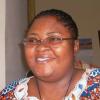The nuns are no longer useful today! They would do better to marry, many men are single!
This exclamation from a crowd of onlookers was made Nov. 30, 2014, from the steps of the Cathedral of Saints Peter and Paul in Douala, Cameroon, at the opening ceremony of the Year of Consecrated Life. And yet, despite their view that women are valuable primarily as wives, these same observers have been surprised by the powerful number of women religious now in Cameroon. Meanwhile, the nuns have grown used to hearing this common cultural opinion and are not disturbed by it.
As a social partner of the state since the advent of the church in Cameroon at the end of the 19th century, the female congregations have not failed their Catholic mission. They are found on all fronts, discreetly working. Known under the name “Sisters” throughout the country, these consecrated congregations dedicate themselves to serving the Gospel through love for Jesus Christ, sometimes paying for their dedication with their lives.
Some have been murdered by bandits; others have died from snakebites, traffic accidents due to poor roads or consequences from limited medical care.
Initially requested by the bishops to support parishes in rural areas of the country, most of which were still unknown to the government, women religious, mainly from Europe, worked hard investing not only in the ministry to indigenous people but also in the fields of education, health, catechesis, supporting young people and preparing young girls for marriage.
Throughout history and faithful to their charisms, the sisters effectively accompanied the overall growth of the country, moving it toward emancipation by creating and multiplying works and development activities. Watered at the source of the Gospel, these missionaries from elsewhere were able to break the locks of culture and tradition to gradually open the doors of devoted life to young local girls, revealing their willingness to bring men and women of all races to Christ.
Cameroon, an emerging Central African country known for its stability, is a great intersection of cultural diversity. More than 250 ethnic groups and tribes live here and speak as many dialects. Imagine the difficulty of the first nuns, average women driven from their original environments to pursue the missionary course into indigenous communities of Africa.
Away from the spotlight, “good sisters,” a priori declared "non-standard" by their lifestyle on the sidelines of worldly considerations, remained sometimes ignored by awards and recognitions. They considered themselves “useless servants,” as described in the Scriptures. Now numbering nearly 2,000 in more than 150 congregations in Cameroon, women religious of myriad cultures and lands have broken through on the difficult path of New Evangelization in Cameroon.
Even the omnipresent threat of war by the Islamic sect Boko Haram in recent years in northern Cameroon did not blunt the missionary zeal of those shadow workers established for more than 50 years in the region.
Far from being confined to their original works of education and health, women's congregations adjust and readjust to the nature and size of current events. They initiate solidarity actions for populations in need, an economic challenge doubly weighted by poverty.
In 2012, when heavy floods invaded the northern region of Cameroon, the sisters were on the front line, ahead of the NGOs. They mobilized spontaneously to bring comfort and even first aid to families affected by the disaster. Fifteen months later, they were present in the eastern region of the country, in the heat of humanitarian action in favor of Central African Republic refugees. This mass of people arrived in Cameroon after the military-political conflict that occurred in the neighboring country where Seleka rebels have sown terror: looting, rapes, sacking of important buildings – they sometimes decimated entire villages forcing populations to flee. Women religious and secular Trinitarians of Africa Region visited the camp called Guiwa in the eastern part of the country several times to bring to Central African refugees crucial donations.
We are far from achieving the original Catholic mission in Cameroon, which was to encourage religious congregations to open enough schools and clinics to serve the needs of indigenous peoples. But the expansion strategy for social change and sustained development, nurtured by women religious in Cameroon, is an essential tool to reach the vulnerable segment of the population. Female religious congregations agree that they may no longer be limited to the role of assistants because the problems are diverse and demand concrete answers in real time.
[Marcelline Manga is a journalist and broadcaster in the Archdiocese of Yaounde, Cameroon. She is a member of the Sisters of the Work of Saint Paul Fribourg, Switzerland.]
